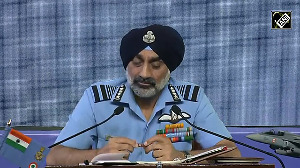A day after warning the government that it will 'plunge into crisis' if the Indo-US nuclear deal was operationalised, the Communist Party of India-Marxist on Monday said the agreement was part of the Manmohan Singh government's attempts 'to integrate India more closely with the US.'
Ahead of its planned protests with other Left parties against the multi-nation naval exercise in the Bay of Bengal, which will also see the US participation, the CPI-M brought out a series of pamphlets on the strategic ties between the two countries, projecting that the accord was aimed at 'pushing through the US agenda' in all fields of concern to the people.
'The majority of Indian Parliament' was against the deal, but the government refused to accept this, it said.
'By refusing to accept the majority view, government sends a message, which is harmful for Indian democracy,' it said in a pamphlet titled Don't Proceed With the Nuclear Deal.
'The deal is more than just one nuclear deal. It is part of pushing through the US agenda in all fields of concern to our people, whether it is the sovereignty of India, the interests of common people, farmers, of workers and employees,' the party said in another pamphlet.
While refuting the government's position on different aspects of the issue, the pamphlets also reiterated why it should not operationalise the 123 agreement.
In another pamphlet titled Nuclear Energy and the Electricity Sector: False Promises, the CPI-M said while coal-based power stations could produce power at Rs 2.50 per unit, nuclear energy will cost between Rs 5.10-5.50 per unit.
'Not only will it cost twice as much, it will cost three times as much money to build a plant with imported nuclear reactor, as it will to build a coal-based power plant,' the pamphlet read.
Claiming that the nuclear reactor industry in the US was in a 'deep crisis,' it said 'very few countries are buying their plants. In America itself, not a single nuclear plant has been set up since 1996.'
'The government says it has no money to expand the power sector. But it is prepared to pay lakhs of crores of rupees to the American nuclear industry to get their plants installed in India for electricity that ordinary people can never afford,' it said.
The party also asked whether it would be 'very short-sighted' to invest a major part of the available resources in nuclear energy.
In this context, the party also referred to the Enron deal in Maharashtra where the US firm had demanded Rs 7 or more per unit of electricity.
'The Maharashtra Electricity Board, which was running with a profit till then, became bankrupt because of Enron. It will be much worse with nuclear energy,' it said.
Besides the nuclear issue, the pamphlets also spoke about the growing Indo-US strategic ties and business relations between the two countries, including in the fields of agriculture and industry.
In the pamphlet titled No Strategic Partnership with America, the CPI-M said even with the nuclear deal yet to be clinched, 'the US has already managed to use the promised deal to secure several valuable defence contracts and to position itself well on the future Indian orders.'
'And for the first time since independence, a process of Americanisation of the Indian military has begun,' it said.
Referring to a series of defence acquisitions, both clinched or being planned, 'the US is of course playing its cards carefully, holding back cutting-edge technologies and weapons systems until it has India firmly in its strategic bag,' it said.
'Thus, the US has not yet cleared the Patriot sales, or sale of the more advanced Arrow missile defence systems and is offering only the P3-C Orions, which it has also sold to Pakistan rather than the more advanced E2 Hawkeye airborne early warning aircraft.'
The CPI-M also noted that it was 'not mere coincidence' that India's ties with US ally Israel was growing and that its Defence Minister Ehud Barak would visit Delhi soon 'seeking to close a deal for co-development with India of unmanned helicopter gunships,' a technology jointly developed by Israel and the US and cleared by Washington.
'The point is not that India should not diversify its arms purchases or should not purchase from this or that source. But it is painfully becoming obvious that India is increasingly shifting its acquisitions towards the US and its Israeli proxy.
'Once it is tied into the US and Israeli arms, India will be continuously under pressure to behave or risk losing its military capabilities,' the CPI-M pamphlet said.





